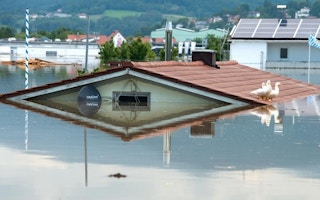The first of the blockbuster Intergovernmental Panel on Climate Change (IPCC) reports is due to be published next week, and already the debate is hotting up over two key uncertainties: how much temperature rise can we expect, and how much the sea level might increase.
As much of the debate about climate change concerns the future, there are bound to be degrees of uncertainty about the timing, pace and severity of possible impacts. But how should scientists communicate them in a way that policy makers and the general public understand them?
The 30-page summary for policy makers, which highlights the main points of the 2,000-page report on the physical science of climate change, is sure to contain lots of uncertainties. Indeed, the word ‘uncertain’ appears around 40 times in the version that has been leaked to the media.
One challenge for mainstream scientists who want action is that many sceptics will claim that there are so many uncertainties around the science that governments should wait for them to diminish before they take any drastic action to curb greenhouse gas emissions.
Another is that there is plenty of evidence from research with focus groups in the USA and the UK indicating that the general public often don’t understand scientific uncertainty. It is often misunderstood by people who can mistake uncertainty for ignorance.
“
Previous studies have shown that ‘doom and gloom’ narratives are attractive to journalists covering the climate change story. But what surprised us was the amount of uncertainty in many of the stories. Nearly half the articles included a quote from a scientist or scientific report indicating some aspect of uncertainty.
Many also fail to make the distinction between ‘school science’, which is a source of solid facts and reliable understanding, and ‘research science’ where uncertainty is engrained and is often the impetus for further investigation.
And how do the media cover the uncertainties? In our study, we looked at how three IPCC reports and recent Arctic sea ice melt were covered in the print media in three newspapers in six countries (Australia, France, India, Norway, the UK and the USA.
We examined how four main messages or narratives about climate change played out in the 340 articles we analysed. The four were:
- Disaster or implicit risk, where the emphasis was on adverse impacts such as sea level rise
- Uncertainty, which included ranges of projections, the presence of sceptical voices or duelling experts, and words like ‘may’, or ‘possible’
- Opportunity, which was the move to low carbon economy, or new shipping routes in the Arctic
- Explicit risk, where the word ‘risk’ was used, or the odds or probabilities of something adverse happening were given, or the everyday concepts or language relating to insurance, betting, or the precautionary principle were included
We found a ‘disaster narrative’ in 82 per cent of the articles in the sample, and a similar proportion about uncertainty. In contrast, articles explaining the ‘explicit risks’ of different policy options featured in just 26 per cent of the articles surveyed. Opportunity messages were also much less common.
Previous studies have shown that ‘doom and gloom’ narratives are attractive to journalists covering the climate change story. But what surprised us was the amount of uncertainty in many of the stories. Nearly half the articles included a quote from a scientist or scientific report indicating some aspect of uncertainty.
Focus on ‘explicit risk’
What was new about our study was a focus on ‘explicit risk’. We did this in part because there are a growing number of politicians and climate change reports which regularly use the language of risk. Indeed, some academic research suggests that risk language may be a better way of communicating climate change than focusing on imminent disasters or uncertainties.
One of the arguments in favour of using risk language is that for policy makers, it shifts the debate away from what would count as conclusive proof or overwhelming certainty before taking action, towards an analysis of the comparative costs and risks of different policy options (including doing nothing).
Another is that risk is an essential part of everyday experience, including the worlds of insurance, health and investment. Many people have to deal with it daily and manage it in different ways: most people in the developed world take out house insurance against the low-probability, very high-impact event of a fire.
Patients are increasingly familiar with the concept of the risks and benefits of different health treatments (though they rely on trusted intermediaries to help them to navigate the risk).
And some of the risk assessments people make are on the same timescale as possible climate impacts – for example, taking out a pension policy into which they pay for 40 years.
The 2012 IPCC report on weather extremes did use a lot of risk language and that was picked up by the journalists. But in general, the language and concept of risk is not yet as embedded into climate change stories as other strong narratives.
This might well change in the future as climate models become better at working out possible scenarios and evaluating how much man-made climate change may have made an extreme weather event like a severe drought more likely.
Such risk assessments usually include probability levels, and what degree of confidence scientists have in their findings. We are all going to have to get better at understanding them.
James Painter is head of the Journalism Fellowship Programme at the Reuters Institute for the Study of Journalism, which belongs to the Department of Politics and International Relations at Oxford University. This post originally appeared here.

















